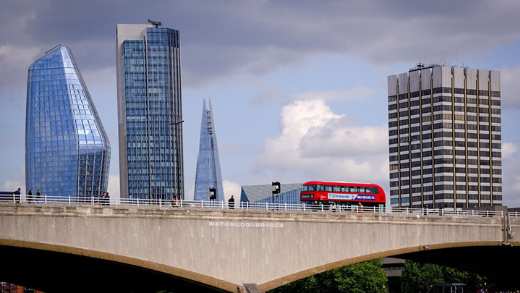...that’s a risk for them and for the rest of us too.
When world leaders assembled in Glasgow to try and turn the tide on the climate emergency, businesses as well as governments were in the spotlight. COP26 underlined the close relationship between climate change and corporate action, from unlocking private finance for the green energy transition to slashing the UK’s greenhouse gas emissions.
However, Aviva’s second Risk Insights Report*, published earlier in November, reveals that climate change is still struggling to make it on to firms’ list of priorities. In a survey of 1,251 UK business leaders about the key risks they faced, climate change failed to make the top 10 for the second year running.
Climate change is no longer a distant threat. Business leaders need to take it seriously.
Climate change, including natural catastrophes and extreme weather, ranked 14th on the list, with only 8% of businesses saying that it was a top risk to their business. When it comes to awareness about environmental, social and governance (ESG) matters, 40% of business leaders admitted to knowing hardly anything or nothing at all, and just a third (34%) said they were reasonably or well informed.
This is a problem. For one thing, we need business leaders on board to deliver drastic cuts in global emissions. And for businesses themselves, a failure to deal with climate risks could be costly. Many of the risks that do make it on to business leaders’ top ten list this year, including the economy, business and supply chain interruptions, and changes in legislation and regulation, are increasingly connected to climate change.
Extreme weather is already taking its toll on UK businesses and their supply chains. Aviva’s Building Future Communities report, published in July this year, revealed that almost a third of UK commercial properties are at risk of flooding and heatwaves. In the past year, we’ve seen wildfires in the US, floods in China and Europe and harsh droughts in South America disrupting international food supplies. And the UK Government has now announced a raft of proposed regulatory changes to tackle the climate crisis, including a requirement for most big UK firms to show how they will hit emissions targets. For some, that will require a radical rethink of how they do business.
Aviva is calling for greater government and cross-industry support.
Climate change is no longer a distant threat. Business leaders need to take it seriously – for their own sake, as well as for their employees, business partners and other stakeholders, and the communities in which they are located. That means doing everything possible to cut greenhouse gas emissions. And it means taking steps to measure and reduce the impacts of climate change on their workforces, operations, supply chains and business reputation – now and in the coming decades.
How do we achieve this? Firstly, Aviva is calling for greater government and cross-industry support to help all businesses better prepare for extreme weather events. This should include initiatives that address common barriers to action, such as financial costs, not knowing how to implement protective measures and being unsure where to start. This can only be delivered by matching the precise impacts of climate change on our varied UK landscape and urban environments with clear, practical steps to help businesses put preventive measures in place.
Greater focus is also needed to help small to medium enterprises (SMEs) recognise and respond to environmental risks. SMEs account for more than 99% of UK enterprises and are vital to the wellbeing of local communities. However, Aviva research found that only a fifth (22%) of SME leaders report knowing a great deal or fair amount about ESG issues, compared to 50% of corporates. Through a new partnership with Enterprise Nation, a small business support network, Aviva has launched a Plan It with Purpose free educational hub to provide SMEs with advice on how to protect their business and reduce their environmental footprint. But the scale of action required will not come from single projects. SMEs need sustained and consistent support from the public and private sector to help them prepare for a future that will be marked by climate change.
None of us will be left untouched by the climate emergency.
Finally, we need expert voices – including policymakers, researchers, industry leaders and those businesses that already consider climate change a significant threat – to help business leaders to recognise the tangible link between environmental and economic risks and treat both with the same rigour and attention.
None of us will be left untouched by the climate emergency. If business leaders want to guard against the risks that worry them the most, they must give climate change the attention it needs too.
Aviva Risk Insights Report, 2021 - top risks facing businesses
1. Economic concerns (37%) | 7. Changes in legislation and regulation (22%) |
2. Shortage of skilled workforce (28%) | 8. Cyber security (20%) |
3. Loss of reputation & brand value (26%) | 9. Market developments – i.e., M&A (17%) |
4. Impacts of Brexit (25%) | 10. Mental health and wellbeing of employees (16%) |
5. Public health events – i.e., Covid-19 (24%) | 10. New and changing technology (16%) |
5. Business interruption inc. supply chain (24%) | 14. Climate change (8%) |
The table ranks the top risks by the % of businesses that said a particular risk is one of the five risks they are most exposed to. N.B.: The list contains joint entries for 5th place and 10th place.
Aviva Risk Insights Report, 2021 - business attitudes to climate
| 1. Top Risks facing business Climate – Listed 14th | 8% of business leaders named the impact of climate change, including natural catastrophes and extreme weather on their business as a risk. 8% of business leaders named the environmental impact of their own business as a risk. |
2. How ‘worried’ about climate | 67% businesses who cited “climate change, including natural catastrophes and extreme weather” as a risk were worried about it. 37% were “extremely worried”. |
3. Urgency to take action on climate | 67% businesses who cited “climate change, including natural catastrophes and extreme weather” felt it was an urgent risk. 31% felt it was “extremely urgent”. |
-ENDS-
Media enquiries:
Diane Mangan
+44 (0)7800 691 714
Liz Kennett
+44 (0)7800 692 675
Notes:
Download the 2021 Aviva Risk Insights Report .
*Research was commissioned by Aviva and carried out by YouGov, which interviewed 1,251 senior business leaders from small, mid-market and corporate companies spread across the UK (as defined by their annual revenue), from a variety of industries: Professional and business services, manufacturing and industry, construction and real estate, Arts, entertainment and leisure, technology and electronics, retail and wholesale, motor trade, charities, and the public sector. Research was conducted between 19 August and 11 September 2021.
Notes to editors:
- We are the UK's leading diversified insurer and we operate in the UK, Ireland and Canada. We also have international investments in India and China.
- We help our 19.2 million (as at 31 December 2023) customers make the most out of life, plan for the future, and have the confidence that if things go wrong we’ll be there to put it right.
- We have been taking care of people for more than 325 years, in line with our purpose of being ‘with you today, for a better tomorrow’. In 2023, we paid £25.6 billion in claims and benefits to our customers.
- In 2021, we announced our ambition to become Net Zero by 2040, the first major insurance company in the world to do so. We are aiming to have Net Zero carbon emissions from Aviva’s operations and supply chain by 2030. While we are working towards our sustainability ambitions, we recognise that while we have control over Aviva’s operations and influence on our supply chain, when it comes to decarbonising the economy in which we operate and invest, Aviva is one part of a far larger global ecosystem. There are also limits to our ability to influence other organisations and governments. Nevertheless, we remain focused on the task and are committed to playing our part in the collective effort to enable the global transition. Find out more about our climate goals at www.aviva.com/climate-goals and our sustainability ambition and action at www.aviva.com/sustainability
- Aviva is a Living Wage, Living Pension and Living Hours employer and provides market-leading benefits for our people, including flexible working, paid carers leave and equal parental leave. Find out more at https://www.aviva.com/about-us/our-people/
- As at 31 December 2023, total Group assets under management at Aviva Group were £376 billion and our estimated Solvency II shareholder capital surplus was £8.8 billion. Our shares are listed on the London Stock Exchange and we are a member of the FTSE 100 index.
- For more details on what we do, our business and how we help our customers, visit www.aviva.com/about-us
- The Aviva newsroom at www.aviva.com/newsroom includes links to our spokespeople images, podcasts, research reports and our news release archive. Sign up to get the latest news from Aviva by email.
- You can follow us on:
- X: www.x.com/avivaplc
- LinkedIn: www.linkedin.com/company/aviva-plc
- Instagram: www.instagram.com/avivaplc
- For the latest corporate films from around our business, subscribe to our YouTube channel: www.youtube.com/user/aviva

















